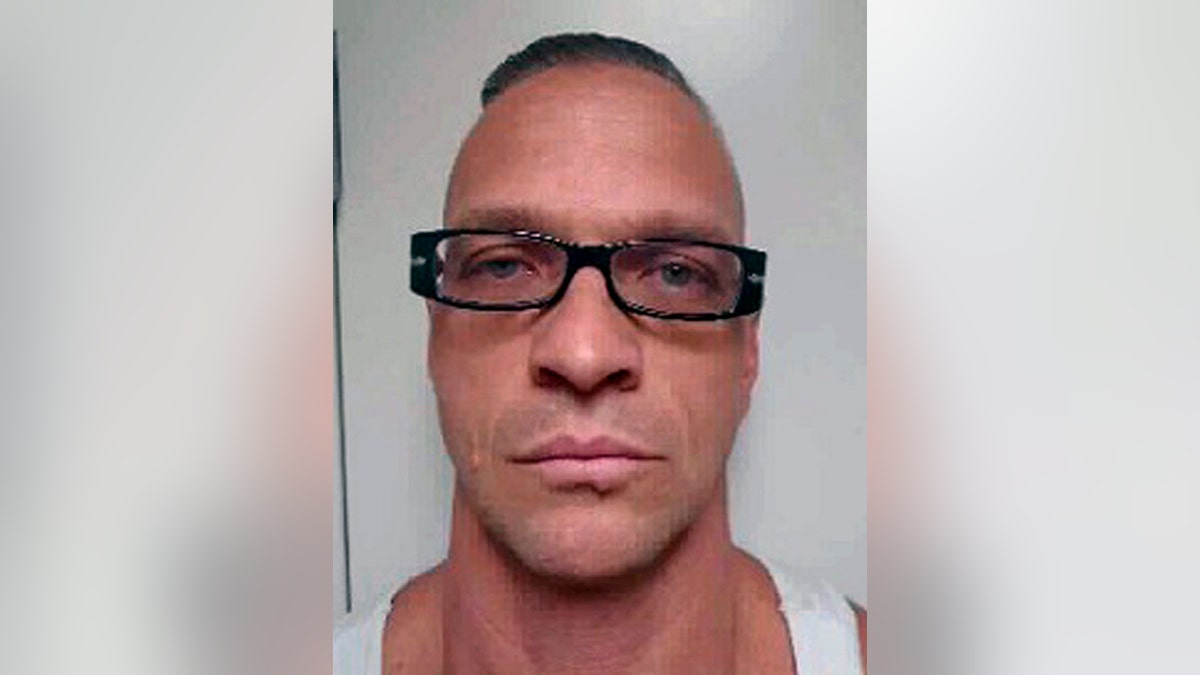
Scott Raymond Dozier was scheduled to be executed Wednesday evening. (Nevada Department of Corrections via AP, File)
A Nevada judge effectively blocked the execution of a two-time killer Wednesday after a pharmaceutical company objected to the use of one of its drugs to put someone to death.
Clark County District Judge Elizabeth Gonzalez disallowed the drug in a ruling that came less than nine hours before Scott Raymond Dozier, 47, was to be executed by injection with a three-chemical combination never before tried in the U.S.
State prison officials later called off the 8 p.m. execution, and a judge issued an order indefinitely postponing it.
Despite the maneuvering around him, Dozier had repeatedly expressed his desire to be put to death and had stopped fighting for his life. His attorney did not immediately respond to messages for comment.
At a hearing earlier in the day, New Jersey-based Alvogen urged the judge to block the use of its sedative midazolam, saying the state illegally secured the product through subterfuge and intended it for unapproved purposes. The pharmaceutical company also raised fears that the drug could lead to a botched execution, citing cases that apparently went awry elsewhere around the country.
Todd Bice, an attorney with Alvogen, accused the state of deceptively obtaining the drug by having it shipped to a pharmacy in Las Vegas rather than the state prison in Ely. He said Alvogen had sent a letter to state officials in April telling them it opposes the use of midazolam in executions.
The judge ruled that based on that letter, Alvogen had a reasonable chance of winning its case, and she issued the temporary restraining order. She set another hearing for Sept. 10.
Pharmaceutical companies have resisted the use of their drugs in executions for 10 years, citing legal and ethical concerns. But the legal challenge filed by Alvogen is only the second of its kind in the U.S., said Robert Dunham, executive director of the Death Penalty Information Center in Washington.
The previous challenge, brought last year by a different company in Arkansas, was ultimately unsuccessful.
Alvogen said in a statement that it was pleased with the ruling and will continue to work through the legal system to ensure its products are not used in executions.
A second pharmaceutical company, Sandoz, also raised objections at Wednesday's hearing to the use of one of its drugs -- the muscle-paralyzing substance cisatracurium -- in executing Dozier. But the company did not immediately ask to formally join Alvogen's lawsuit.
The third drug in Nevada's combination is fentanyl, the powerful opioid that is blamed for deadly overdoses across the country but has not been used before in an execution. The fentanyl for Dozier's execution was made by Akorn Inc., prisons spokeswoman Brooke Santina said.
Jordan T. Smith, an assistant Nevada solicitor general, countered at Wednesday's hearing that the state didn't put up a "smokescreen" or do anything wrong in getting the drugs. He said drugs ordered by the state prison system are regularly shipped to Las Vegas.
"This whole action is just PR damage control," Smith said of Alvogen.
Alvogen's midazolam was substituted in May for Nevada's expired stock of diazepam, commonly known as Valium. The drug is intended to render the inmate unconscious. Under Nevada's new execution protocol, the inmate is next given fentanyl and then cisatracurium, one to slow his breathing, the other to stop it.
Bice said Alvogen does not take a position on the death penalty itself but opposes the use of the drug in a way that is fundamentally contrary to its purpose -- saving and improving lives.
In court papers, Alvogen also cited instances in Alabama, Arizona and Oklahoma in the past few years in which inmates given midazolam were left gasping or snorting, appeared to regain consciousness or took an unusually long time to die.
Dozier attempted suicide in the past and has said repeatedly that he prefers execution to life behind bars.
"Life in prison isn't a life," the Army veteran and methamphetamine user and dealer told the Las Vegas Review-Journal recently. In court hearings and letters, he said there is a limit to how much artwork and exercise a person can do in prison.
Dozier was sentenced to death in 2007 for robbing, killing and dismembering 22-year-old Jeremiah Miller at a Las Vegas motel in 2002. Miller had come to Nevada to buy ingredients to make meth. His decapitated torso was found in a suitcase.
In 2005, Dozier was sentenced to 22 years in prison for shooting to death another drug-trade associate, whose body was found in 2002 in a shallow grave outside Phoenix. A witness testified Dozier used a sledgehammer to break the victim's limbs so the corpse would fit in a plastic storage container.
Nevada's last execution was in 2006.









































